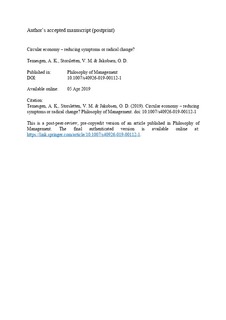| dc.contributor.author | Temesgen, Amsale Kassahun | |
| dc.contributor.author | Storsletten, Vivi M. L. | |
| dc.contributor.author | Jakobsen, Ove Daniel | |
| dc.date.accessioned | 2019-09-24T12:37:33Z | |
| dc.date.available | 2019-09-24T12:37:33Z | |
| dc.date.created | 2019-04-08T14:26:05Z | |
| dc.date.issued | 2019 | |
| dc.identifier.citation | Temesgen, A. K., Storsletten, V. M. & Jakobsen, O. D. (2019). Circular economy – reducing symptoms or radical change? Philosophy of Management. doi: | nb_NO |
| dc.identifier.issn | 2052-9597 | |
| dc.identifier.uri | http://hdl.handle.net/11250/2618531 | |
| dc.description | Author's accepted version (postprint). | nb_NO |
| dc.description | This is an Accepted Manuscript of an article published by Springer Nature Switzerland AG in Philosophy of Management on 05 April 2019. | |
| dc.description | Available online: https://doi.org/10.1007/s40926-019-00112-1 | |
| dc.description.abstract | In this article, we address why our management of the economy, community and business has led to global warming and we discuss the importance of worldviews, ontology, epistemology and axiology in the search for alternative paths of development. We do this by focusing on the concept of Circular Economy. Circular Economy is often presented as a solution to the problems of a globalized economy in the form of over-exploitation of resources, climate change and pollution of the environment. Within the mainstream economics paradigm, the aim is how to increase the effectiveness of resource extraction and utilization in order to maintain growth. We contrast this with the paradigm of Ecological Economics where the goal of the economy is to achieve and secure a higher quality of life. Circular Economy often side steps the deep ontological and epistemological questions we need to answer if we are to address the complex and interrelated environmental, economic and social problems we face today. This can be a limiting factor in the search for creative and long-term solutions. However, within the Circular Economy discourse, we find strands that critically engage with the foundations of mainstream Economics and so, innovative solutions for the society of the future are a possibility. We argue that to bring about a lasting solution to the interconnected social, economic and environmental problems, Circular Economy must engage with the ontological, epistemological and axiological foundations of mainstream economics. To further this argument, we apply Imre Lakatos’ ‘research program’ model to philosophy of science as our framework of analysis and draw lessons for business and communities. | nb_NO |
| dc.language.iso | eng | nb_NO |
| dc.publisher | Springer | nb_NO |
| dc.relation.uri | https://doi.org/10.1007/s40926-019-00112-1 | |
| dc.title | Circular economy – reducing symptoms or radical change? | nb_NO |
| dc.type | Journal article | nb_NO |
| dc.type | Peer reviewed | nb_NO |
| dc.description.version | acceptedVersion | nb_NO |
| dc.subject.nsi | VDP::Samfunnsvitenskap: 200::Økonomi: 210 | nb_NO |
| dc.source.pagenumber | 20 | nb_NO |
| dc.source.journal | Philosophy of Management | nb_NO |
| dc.identifier.doi | 10.1007/s40926-019-00112-1 | |
| dc.identifier.cristin | 1690880 | |
